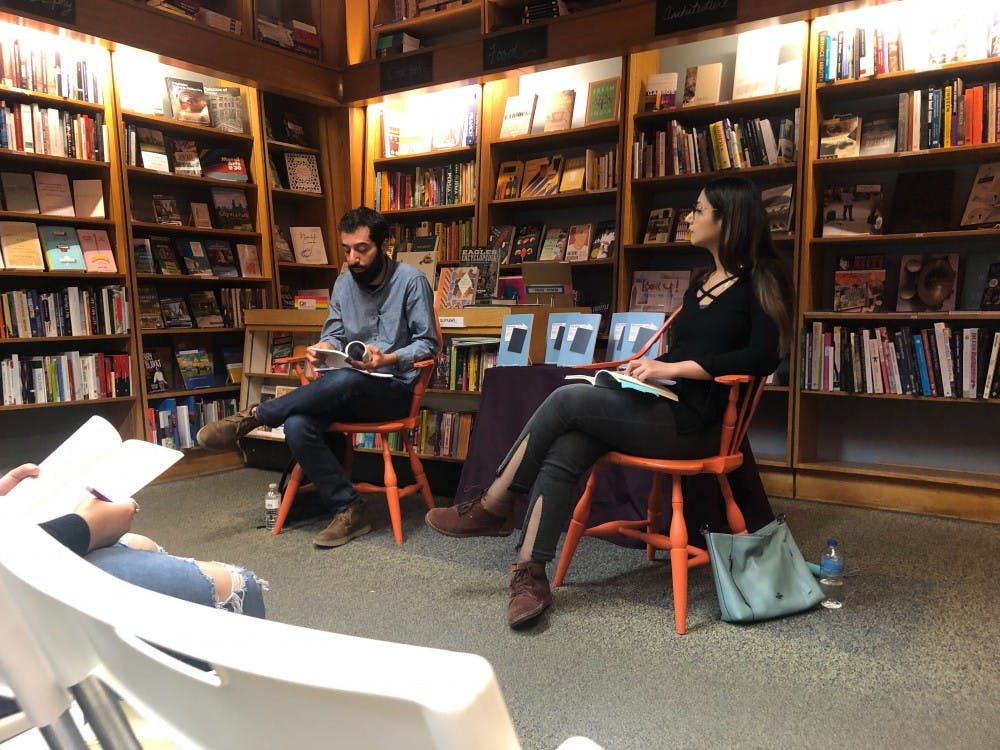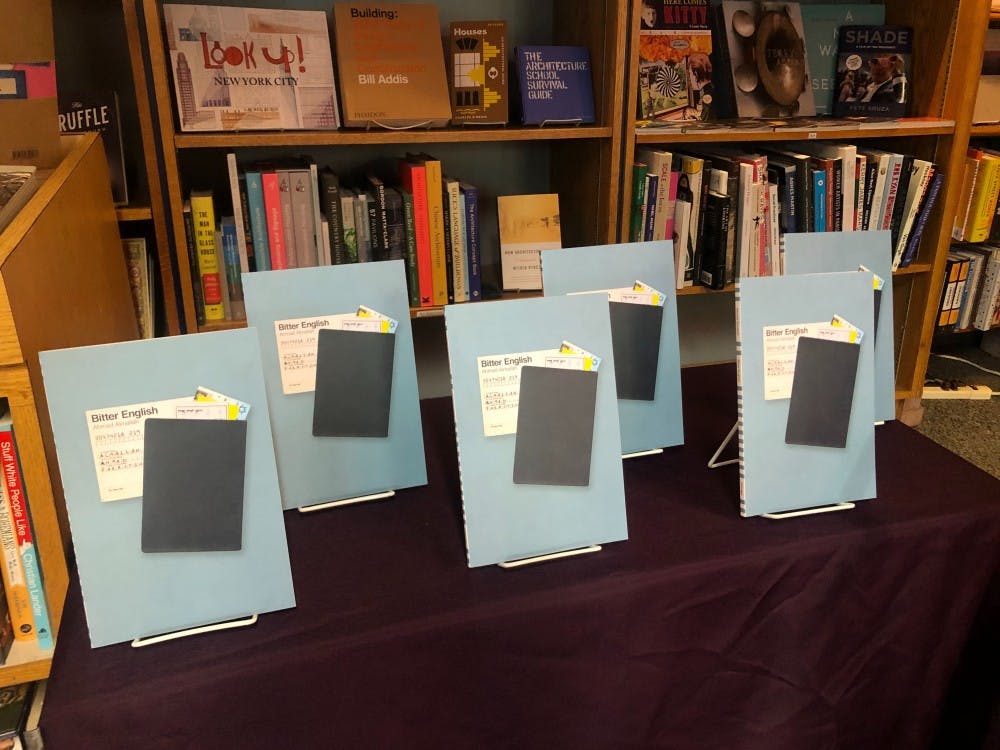
Palestinian-American poet Ahmad Almallah (left) and Arabic Literature Ph.D. student Esraa al-Shammari (right).
Credit: Zoey WeismanAhmad Almallah, a Palestinian-American poet and Penn Arabic language lecturer, read from his new book "Bitter English" at a Penn Book Center event on Sept. 26.
At the event, Almallah spoke about his experience as an immigrant and the struggle of adopting the English language as his own. He read several poems aloud from "Bitter English," an autobiographical collection of poems he wrote over four years that was published earlier this month. The book depicts the challenges Almallah faced as a Palestinian immigrant to the United States, finding himself caught between his native Arabic language and his adopted English language.
In between the poems, Arabic Literature Ph.D. student Esraa al-Shammari engaged in discussion with Almallah about the context behind the pieces and his experience writing them. Almallah also took questions from the audience at the end of the event, which was hosted by Penn's Middle East Center.
Almallah began with a reading of the book's opening poem, “Bitter English," which centers on the tension and distance Almallah has with the English language.
“That I find this English tongue that I use day after day, boring in construction, even in poetry, cuts me,” Almallah read from the poem. He added that this defamiliarization of the English language was an advantage to his poetry.

The event was held at the Penn Book Center.
“The language is so uncomfortable to me, which is a good thing, for writing a poem," Almallah said. "You don’t want to be too comfortable with writing your language."
Almallah also read his poem "Jisr," which discussed his experiences traveling in Palestine. Almallah explained that this Arabic word (جسر) translates to “bridge,” but Palestinians understand it as the border control structure for crossing from Palestine to Jordan and vice versa. He acknowledged the difficulty of writing about the experience of traveling in the West Bank.
“I’ve always wanted to write a poem about this experience, and I always fail," he said. “Despite the harshness of the experience, it gives way to a lot of waiting and it gives way to a lot of reflection and looking outside the windows of vehicles."
Almallah added that while his poetry depicts his experience as a Palestinian immigrant, he does not want to be confined to the stereotype of a Palestinian or Arab poet alone.
“I want to be represented for my poems,” he said.
Later, Almallah talked about his process for writing "Bitter English," his first poetry collection. He said that as a tenured Arabic Language professor at Middlebury College, he was unable to find inspiration to write poetry. When his wife was offered a position as an Arabic Literature professor at Penn, he decided to leave his stable job at Middlebury and move to Philadelphia.
“When we came to Philly, and I quit had this job, I came with this vague idea that I want to write and follow through on becoming a poet," Almallah said. Five years later, after becoming a teaching fellow at the Wolf Humanities Center and an Arabic language instructor, Almallah published his first book.

Almallah added that while his poetry depicts his experience as a Palestinian immigrant, he does not want to be confined to the stereotype of a Palestinian or Arab poet alone.
When an attendee asked Almallah if he writes any poetry in Arabic, Almallah said he does a little bit but chose not to in "Bitter English." As a scholar of Arabic literature, he felt too familiar with the poetry to effectively write his own, and instead he chose to cut ties with his native language.
“There were already made sounds that I was recreating in Arabic. I know meter very well and I was repeating myself," he said. "I exiled myself into English, into a language I am not that comfortable with."
Al-Shammari said Almallah plays with Arabic poetic forms in his work.
"You can see how he’s employing these instruments for this heritage to a different language, different traditions, different audiences,” she said. “It’s straightforward and simple, but amazingly simple.”
After completing “Bitter English,” however, Almallah said he noticed an improvement in his Arabic writing.
“Recently when I tried to write in Arabic, it felt that I was actually creating something more interesting in Arabic," he said. "I am waiting for the opportunity to give it more time so I can see where it can go."
The Daily Pennsylvanian is an independent, student-run newspaper. Please consider making a donation to support the coverage that shapes the University. Your generosity ensures a future of strong journalism at Penn.
Donate







